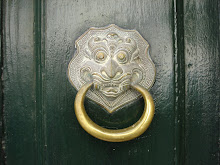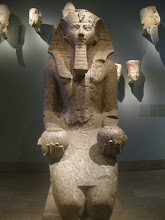We were invited for iftar at Tarek's uncle's house today. Although the only one actually fasting is Tarek's aunt, we all waited for the maghreb prayer before we sat down to break the fast.
Tarek's uncle lives outside of Ramallah at the end of a bumpy road, on the slope of a hill looking out over an olive tree terraced valley. His house is new, huge and has a big flat screen TV in the sitting room.
After the bamya, batinjan, malfouf mahshy and the salad, we sat down in front of the TV to watch Palestine's government TV, Falesteen.
Falesteen has a Ramadan special this year. Every night, they show one of their reporters walking around refugee camps in Lebanon, knocking on people's doors, stopping people on the street, asking them if he can know their name and where they're from.
Tonight, most of them were born of parents who fled from Akka in the north of what is today Israel. They were born into refugee camps in Lebanon, a country where they make up roughly 10 % of the population but enjoy almost no social or civic rights at all. They have no access to public social services, very limited access to health care and education, and they are forbidden by Lebanese law to work in around 20 different professions.
Wait, I'm not sure you got this: If your parents fled from Palestine and you were born in Lebanon, you are not allowed to be a dentist, you can't work as a doctor, you are forbidden by law to become a lawyer or an engineer, and you can never work as an accountant.
Yes.
Around half of the 425,000 UNRWA registered refugees (as opposed to the non-registered refugees who fall outside of UNRWA's statistics and sometimes outside of their social service system) live in the 12 UN administered camps where UNRWA provides basic health care and education. But because of the very difficult conditions under which Palestinian refugees live in Lebanon, the number of refugees living in abject poverty is higher than in any other of UNRWA's camps in the region.
They suffer from overcrowding, unemployment, poor housing conditions and no proper infrastructure, and many of the kids are so disillusioned with life that they drop out of school.
(Where do I get this information? UNRWA's website).
So it is to these camps that Palestine TV send out a reporter every day this Ramadan, to extend a hand from those who might not have much, living under occupation in their homeland, to those who have less, living in exile after having fled from their homeland.
The reporter walks around, like I said, and talks to people. And in some kind of attempt to reconnect these people with their roots, he asks,
"What is the capital of Palestine?"
And half of the time, they can't reply. So the reporter helps them a little and goes,
"Al-Quds, right?" Jerusalem.
Yes, of course!
And then he will sometimes say, "So can you mention five other cities in Palestine?"
Sometimes they will remember Ramallah, sometimes Gaza. But never do they mention the city their parents were from, and the reporter has to help them again.
"Areeha, Al-Khalil, Yafa, Haifa, Jenin, Nablus, Bethlehem..."
Other times he will ask the name of the famous church in Jerusalem, or the famous church in Bethlehem. And again, most of the times, he has to fill in the names.
But every time, he pulls out a hundred dollar bill, says that they did well, wishes them a Ramadan karim and sticks the dollar bill into their hands.
It's not really a quiz so much as a way to remind them of where they come from--they're not just poor refugees living in squalid refugee camps in Lebanon, they're Palestinians.
Tonight, in the last house the reporter visited, a small child in diapers was standing in front of a fan, and an old man in shorts and a white t-shirt invited the TV team inside. The reporter is sweating a little in the heat as he starts asking him the same questions he asked everybody else.
But this man knows the capital of Palestine, he doesn't need any reminders. He has fought in the Palestinian revolution for 25 years. For 25 years he has been loyal to the PLO! Only to be left behind in this refugee camp. Like a dog, he says.
The reporter replies but I can't understand. He hands over the hundred dollar bill and the man with the gray hair accepts it and starts weeping. He sits in his sofa and weeps on national Palestinian TV. The reporter leans in and gives him a hug.
And now, writing this, I started crying and I don't know how to end this blog post.
I will go out for a walk.

Tarek's uncle lives outside of Ramallah at the end of a bumpy road, on the slope of a hill looking out over an olive tree terraced valley. His house is new, huge and has a big flat screen TV in the sitting room.
After the bamya, batinjan, malfouf mahshy and the salad, we sat down in front of the TV to watch Palestine's government TV, Falesteen.
Falesteen has a Ramadan special this year. Every night, they show one of their reporters walking around refugee camps in Lebanon, knocking on people's doors, stopping people on the street, asking them if he can know their name and where they're from.
Tonight, most of them were born of parents who fled from Akka in the north of what is today Israel. They were born into refugee camps in Lebanon, a country where they make up roughly 10 % of the population but enjoy almost no social or civic rights at all. They have no access to public social services, very limited access to health care and education, and they are forbidden by Lebanese law to work in around 20 different professions.
Wait, I'm not sure you got this: If your parents fled from Palestine and you were born in Lebanon, you are not allowed to be a dentist, you can't work as a doctor, you are forbidden by law to become a lawyer or an engineer, and you can never work as an accountant.
Yes.
Around half of the 425,000 UNRWA registered refugees (as opposed to the non-registered refugees who fall outside of UNRWA's statistics and sometimes outside of their social service system) live in the 12 UN administered camps where UNRWA provides basic health care and education. But because of the very difficult conditions under which Palestinian refugees live in Lebanon, the number of refugees living in abject poverty is higher than in any other of UNRWA's camps in the region.
They suffer from overcrowding, unemployment, poor housing conditions and no proper infrastructure, and many of the kids are so disillusioned with life that they drop out of school.
(Where do I get this information? UNRWA's website).
So it is to these camps that Palestine TV send out a reporter every day this Ramadan, to extend a hand from those who might not have much, living under occupation in their homeland, to those who have less, living in exile after having fled from their homeland.
The reporter walks around, like I said, and talks to people. And in some kind of attempt to reconnect these people with their roots, he asks,
"What is the capital of Palestine?"
And half of the time, they can't reply. So the reporter helps them a little and goes,
"Al-Quds, right?" Jerusalem.
Yes, of course!
And then he will sometimes say, "So can you mention five other cities in Palestine?"
Sometimes they will remember Ramallah, sometimes Gaza. But never do they mention the city their parents were from, and the reporter has to help them again.
"Areeha, Al-Khalil, Yafa, Haifa, Jenin, Nablus, Bethlehem..."
Other times he will ask the name of the famous church in Jerusalem, or the famous church in Bethlehem. And again, most of the times, he has to fill in the names.
But every time, he pulls out a hundred dollar bill, says that they did well, wishes them a Ramadan karim and sticks the dollar bill into their hands.
It's not really a quiz so much as a way to remind them of where they come from--they're not just poor refugees living in squalid refugee camps in Lebanon, they're Palestinians.
Tonight, in the last house the reporter visited, a small child in diapers was standing in front of a fan, and an old man in shorts and a white t-shirt invited the TV team inside. The reporter is sweating a little in the heat as he starts asking him the same questions he asked everybody else.
But this man knows the capital of Palestine, he doesn't need any reminders. He has fought in the Palestinian revolution for 25 years. For 25 years he has been loyal to the PLO! Only to be left behind in this refugee camp. Like a dog, he says.
The reporter replies but I can't understand. He hands over the hundred dollar bill and the man with the gray hair accepts it and starts weeping. He sits in his sofa and weeps on national Palestinian TV. The reporter leans in and gives him a hug.
And now, writing this, I started crying and I don't know how to end this blog post.
I will go out for a walk.


















No comments:
Post a Comment